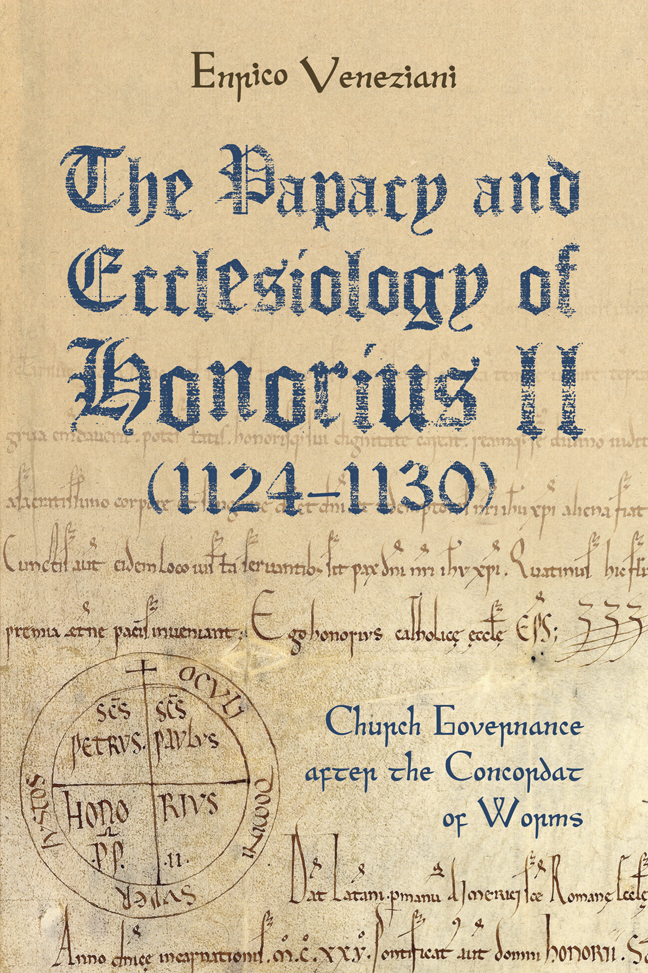 The Papacy and Ecclesiology of Honorius II (1124-1130)
The Papacy and Ecclesiology of Honorius II (1124-1130) Book contents
- Frontmatter
- Dedication
- Contents
- List of Illustrations
- Acknowledgements
- List of Abbreviations
- Introduction
- 1 Honorius II and Roman primacy: continuities and innovations
- 2 The instruments used to assert Roman primacy
- 3 Honorius's deafening silences: his relations with lay powers
- 4 Ecclesiology at work: a case study of Montecassino
- Conclusion
- Appendix: A preliminary calendar of the letters of Honorius II
- Bibliography
- Index
- Studies in the History of Medieval Religion
1 - Honorius II and Roman primacy: continuities and innovations
Published online by Cambridge University Press: 09 January 2024
- Frontmatter
- Dedication
- Contents
- List of Illustrations
- Acknowledgements
- List of Abbreviations
- Introduction
- 1 Honorius II and Roman primacy: continuities and innovations
- 2 The instruments used to assert Roman primacy
- 3 Honorius's deafening silences: his relations with lay powers
- 4 Ecclesiology at work: a case study of Montecassino
- Conclusion
- Appendix: A preliminary calendar of the letters of Honorius II
- Bibliography
- Index
- Studies in the History of Medieval Religion
Summary
This chapter deals with the theoretical assertions of Roman primacy during Honorius II's papacy and the consequences this entailed for the Church as a whole. The methodological approach takes Roman primacy as a ‘living entity’, ever evolving, to which each pontificate added new elements without following a predetermined plan. Everything was left fluid and uncertain except the idea that the Church should be fully oriented towards Rome, the only source of legitimacy, as clearly expressed by Fragment A, an anonymous text that probably circulated in the last years of the pontificate of Gregory VII and was included in the Collectio canonum of Cardinal Deusdedit, dedicated to Victor III (1086–1087). However, this idea of papal centrality was problematic and generated criticism even among the reformers, as attested by the same Fragment A (and by the whole collection of Deusdedit).
My argument is that Honorius II's pontificate can be seen as a normalising, bureaucratic, legal, and practical papacy with a significant degree of creativity. Certain previous assertions were clarified and given a legal basis. They were expressed in new ways, but further elements were also added to their contents, often adapted to the pope's needs and the situations in which each assertion was used. This chapter shows how most of these innovations were triggered by the newly peaceful situation after the clash with the Empire. The twelfth century was a period in which Rome was improving its instruments for governing the Church, and this alteration was in accordance with the radical changes in this century in general, which has resulted in the idea of a ‘Twelfth-Century Renaissance’.
Most of the assertions of primacy are found in the so-called Primatsarengen, to use Heinrich Fichtenau's term. Roughly 200 of the extant letters start with a proposition expressing and claiming a role of supremacy for Rome. Particular attention will be paid to the language and context of these epistles and to their recipients in order to determine how far these elements influenced the style and tone. The lack of surviving canon law collections produced during this papacy also makes it necessary to use these letters: according to Lotte Kéry's list, only the Collectio Catalaunensis I (either 1125 or 1130) and the Collectio 9 librorum (written in about 1123 but, according to Gilchrist, compiled in about 1125) may be ascribed to these years.
- Type
- Chapter
- Information
- The Papacy and Ecclesiology of Honorius II (1124-1130)Church Governance after the Concordat of Worms, pp. 25 - 77Publisher: Boydell & BrewerPrint publication year: 2023
